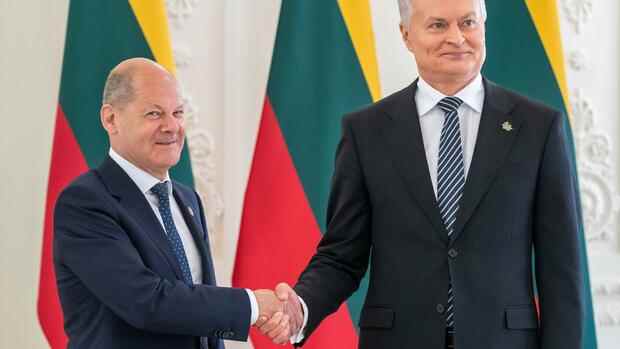Riga Chancellor Olaf Scholz has promised Lithuania additional military support to deter and defend against a possible Russian attack. “We have made it our goal to increase our contribution,” said the SPD politician. The German commitment should be developed “in the direction of a robust combat brigade”.
The Chancellor was received by Lithuanian President Gitanas Nauseda in the capital Vilnius on Tuesday. He also met the heads of government of all three Baltic states. In addition to Ingrida Simonyte from Lithuania, these include Kaja Kallas from Estonia and Krisjanis Karins from Latvia.
“As allies in NATO, we feel obliged to each other and we will defend every inch of NATO territory in the event of an attack,” said Scholz. The Chancellor initially did not give details of the increased German commitment.
In addition to Germany’s plans to increase the military presence in Lithuania, the Chancellor’s visit was about support for Ukraine and the country’s EU perspective, as was announced in advance. While the Baltic states are in favor of making Ukraine a candidate for EU membership, the German government is still undecided.
Top jobs of the day
Find the best jobs now and
be notified by email.
Arms deliveries to Ukraine were also an issue. According to Chancellor Scholz, the federal government has not applied for an export license for Leopard infantry fighting vehicles to Ukraine. If one were provided, the government would carefully examine it, Scholz said on Tuesday in the Lithuanian capital Vilnius.
The Spanish newspaper El Pais had previously reported that the Spanish government wanted to supply Ukraine with German Leopard 2 A4 main battle tanks and anti-aircraft missiles. These are said to be mothballed tanks that would first have to be prepared for delivery to Ukraine. The federal government would have to agree to an export from Spain.
According to Spanish media reports, Madrid wants to send tanks of this type to the Ukraine – which requires an export license from the federal government.
(Photo: dpa)
Scholz dismissed allegations that Germany was not providing Ukraine with sufficient military support: “Germany is one of Ukraine’s most important military supporters.” At the same time he referred to extensive deliveries of equipment and ammunition. Latvian Prime Minister Karins praised the German government’s military support for Ukraine. His Estonian colleague Kallas welcomed the fact that Germany now also wants to supply Ukraine with modern air defense systems.
Scholz also defended his phone calls with Russian President Vladimir Putin against criticism. These are important in order to keep making it clear to Putin that his strategy of attacking Ukraine is not working.
The Baltic heads of state and government, on the other hand, were much more critical. “Our goal is clear: Russia must lose this war and Ukraine must win it,” said Latvian Prime Minister Karins.
Like Nauseda, he criticized a remark by French President Emmanuel Macron that one should not humiliate Russia. “We will humiliate Russia in the spirit of Macron, both militarily and economically,” he said.
Scholz will also meet Bundeswehr soldiers
Lithuania borders the Russian exclave of Kaliningrad and Russia’s ally Belarus. The state in the Baltic States is concerned about its security because of the Russian actions in Ukraine. Along with Latvia, Estonia, Poland and Norway, the country is one of the five NATO countries that have a land border with Russia. Finland could soon be joined by another. Like Estonia and Latvia, Lithuania has been a member of NATO and the EU since 2004.
Following the talks in Vilnius, Scholz will travel to a military training area near Prabade to meet Bundeswehr soldiers there. More than 1,000 of them are stationed in Lithuania to secure NATO’s eastern flank. The Bundeswehr has had a NATO unit at the Rukla military base since 2017.
Against the background of the Russian aggression against Ukraine, NATO was reinforced there with additional forces from Germany, Norway and other countries before the start of the large-scale invasion in February. The number of soldiers was increased from around 1,200 to around 1,600, with the Bundeswehr providing the largest contingent.
Whether the troops on the eastern flank of the alliance will be increased again will be discussed at a summit meeting of the military alliance at the end of the month in Madrid. Foreign Minister Annalena Baerbock (Greens) had already promised a “substantial contribution” from Germany during a visit to Lithuania in April.
>> Read here: What can the German air defense system Iris-T SLM do?
“We are grateful for their contribution to the security of our country and the entire region. We are ready to welcome additional troops by providing all necessary support and infrastructure,” Nauseda said ahead of Tuesday’s meeting with Scholz.
Nauseda stressed the importance of the summit for the Baltic States. “The NATO summit in Madrid must be the summit of decisions,” he told the German Press Agency before Scholz’s visit. “We hope to agree at the summit: on a transition from deterrence to forward defense, from a battalion to a brigade, from air surveillance to air defense.”
Kaja Kallas, Prime Minister of Estonia, expressed satisfaction with the meeting on Tuesday. She tweeted a photo of the meeting, adding the words: “Germany is ready to step up its engagement in our region. This also paves the way for the NATO summit in Madrid.”
Florian Schröder, Managing Director of the German-Baltic Chamber of Commerce, sees a great opportunity in Scholz’s visit. “Germany is heavily involved in Lithuania both economically as the largest foreign investor and in terms of security policy with the Bundeswehr,” he said. However, Germany’s reputation in the Baltic region has “suffered in recent weeks due to the hesitant communication regarding support for Ukraine”. Now there is an opportunity to “clear up these misunderstandings and deepen strategic cooperation.”
More: “We are well prepared”: How NATO is preparing for a cyber war in Estonia
